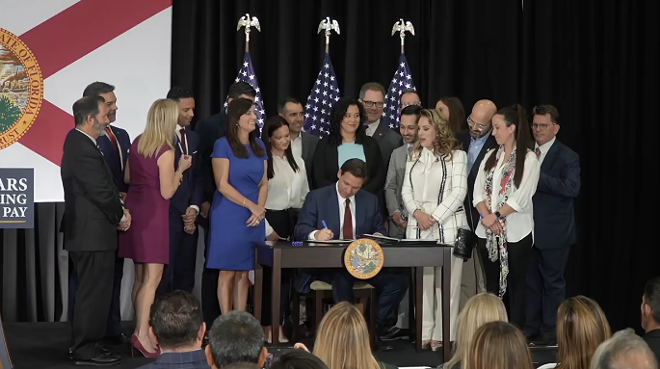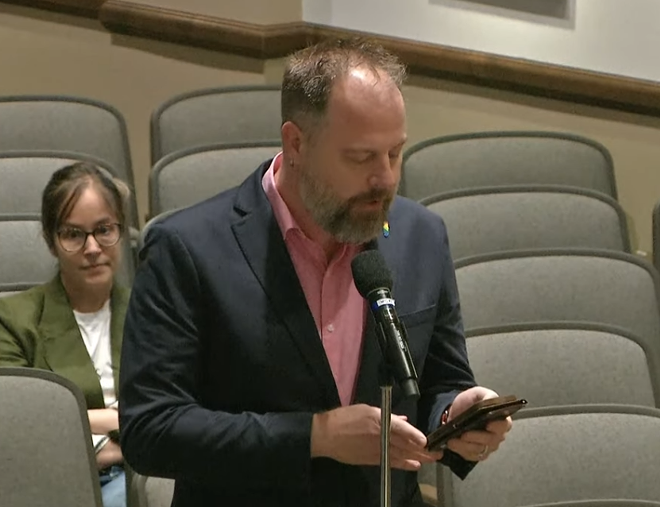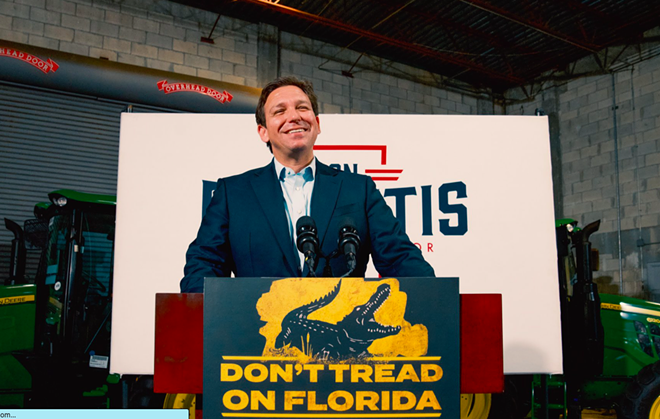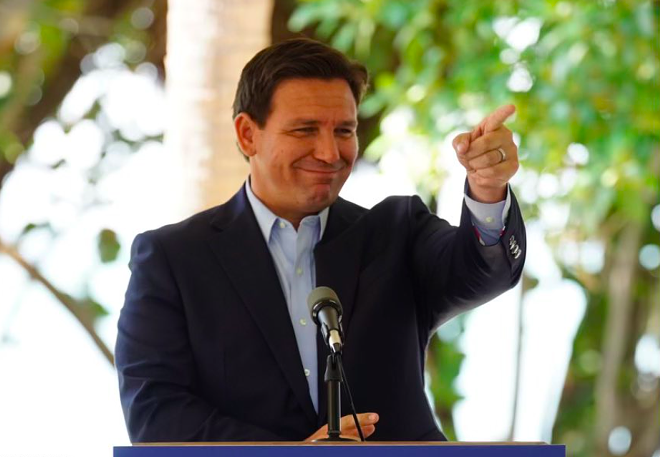On the same day that Florida Gov. Ron DeSantis signed into law a bill described as “union-busting” by critics, Florida unions representing educators and city employees filed two separate lawsuits against the state, alleging the bill is unconstitutional and a blatant example of “government overreach.”
One lawsuit, filed in federal court in Tallahassee, was filed by the Florida Education Association, a labor union representing over 150,000 teachers and school staff across the state, and three affiliated labor unions: the United Faculty of Florida (representing full-time faculty), the United Faculty of Florida at the University of Florida, and the Alachua County Education Association.
“We assert that the law is unconstitutional on its face,” the FEA wrote in a prepared statement.
The lawsuit claims the bill violates educators’ First Amendment rights, equal protection of laws under the 14th Amendment of the U.S. Constitution. Plaintiffs also say the law infringes on workers’ collective bargaining rights, which are enshrined in Florida’s state constitution.
Educator unions, many of which also represent school counselors, media specialists, paraprofessionals and other school staff, have been considered the law’s primary target.
Before the legislative session even began, DeSantis unveiled a “Teachers Bill of Rights” proposal in January that he claimed would “protect teachers from overreaching school unions.”
The Florida Education Association says that, like the Walt Disney Co. — which also sued him last month — DeSantis has intentionally created a political enemy of teachers’ unions over disagreements on reopening schools during the pandemic, mask mandates, policies dictating what teachers can and cannot teach.
The FEA also endorsed the Republican governor’s Democratic opponent last year, Charlie Crist, who chose a teachers union president as his running mate to help unseat the governor.
“We as educators of Florida exercise our constitutional rights, and for doing so we have faced political retribution by the governor of this great state,” said Andrew Spar, FEA president, on a press call announcing the lawsuit on Wednesday.
Modeled after legislation that’s failed to pass during previous legislative sessions, the new law (SB 256) bans automatic payroll deductions of dues from union members’ paychecks, requires unions to pay for annual financial audits that can cost thousands of dollars (a price tag that could bankrupt unions with smaller budgets), and requires that unions maintain a minimum membership of 60% of eligible employees — an arbitrary threshold — or risk decertification.
These provisions could make it harder for public sector unions to function, and to survive in a state where less than one-third of public employees are represented by a union as is.
And it’s not just education unions that will be affected.
“This was very strictly an attack on working people.”
tweet this
The new law will also impact a broad range of unions representing workers on the frontlines of local communities, from bus drivers to sanitation workers, public healthcare workers, librarians, emergency dispatchers and more.
But DeSantis, stuck on his anti-teacher union agenda, didn’t acknowledge those workers as he was signing into law what he called a “paycheck protection” initiative for educators (a dog whistle for legislation aiming to undercut public sector collective bargaining).
Notably, unions representing law enforcement, firefighters, corrections staff and probation officers — which endorsed him and other Republicans for office — are largely exempted from the bill.
After transit unions warned legislators that the bill could cost the state of Florida over $500 million in federal transit funds, those unions also got a carve-out of sorts.
Police and firefighter union leaders, for their part, have largely remained silent on their exemption from the bill this year.
This wasn’t the case when they would have been affected by a similar bill, without a carve-out, in 2011.
“We have traditionally been a Republican-based organization,” said the Florida Fraternal Order of Police president at the time, per the New York Times. “How much more conservative can you get than the police officers? Who wants to go against the cops and firefighters on these matters?”
Apparently, not Florida’s Republicans lawmakers, who get plenty of donations from police unions during election years, nor DeSantis.

Photo via Ron DeSantis/Twitter
Florida Gov. Ron DeSantis signs into law multiple education bills, including a bill targeting teachers unions, on May 9, 2023.
But it’s not a new addition this year. A similar bill last year would have also carved out police and firefighters.
It also proposed requiring a membership threshold of 50%, rather than the 60% imposed by the bill signed into law Tuesday.
That threshold would have posed less of a threat to Florida’s teachers’ unions, which were already required by law to meet 50% membership under a 2018 bill signed into law by former Governor Rick Scott.
Unions that weren’t carved out of the bill say the move to exempt police and firefighter unions is blatantly political.
“We maintain this law is unconstitutional on its face, irrespective of any bad motives on the part of the governor,” said Spar on Wednesday. “However, we do believe there are bad motives. The governor is using this legislation to retaliate against his critics.”
A second lawsuit — oh my!
The education unions’ lawsuit, however, isn’t the only legal challenge the new law is facing.
The News Service of Florida reported Wednesday that another lawsuit was filed on Tuesday in the Leon County Circuit Court by labor unions that represent city employees in South Florida, with three individual union members joining as plaintiffs.
Like the suit filed by the education unions, the city workers’ union lawsuit claims the law violates workers’ collective bargaining rights under the Florida state constitution.
The lawsuit also alleges that SB 256 violates equal-protection rights and unconstitutionally “impairs” already existing contracts.
“SB 256 prohibits employees from voluntarily paying dues via deductions from their paychecks and prevents their chosen representatives from negotiating over the same,” the lawsuit reads, according to the News Service of Florida, with two AFSCME locals and the Professional Managers and Supervisors Association named as plaintiffs.
“SB 256 also eliminates the right of public employees to be represented by a union chosen by majority representation irrespective of dues payment despite the fact that Florida is, under our Constitution, a right-to-work state,” the lawsuit adds.
Under Florida’s right-to-work policy, workers aren’t required to become dues-paying union members in order to reap the benefits of a union contract.
Workers told Orlando Weekly this makes it difficult to achieve a minimum 60% membership, because there’s less incentive to pay in if you can already benefit from what a contract offers (such as scheduled raises, certain job benefits, and the like) without financially supporting your union.
A legislative staff analysis of the bill, released prior to its passage, found that over 40 of the state’s teachers unions, for instance had membership rates below the 60% threshold required of the new law, as of the 2021-22 school year.
Preparing for what lies ahead
Beyond legal challenges, union members across the state have been preparing for what will happen if the new law’s requirements for Florida’s unionized public sector go into effect on July 1, as mandated.
Emily Griest, a high school art teacher in Hillsborough County, told Orlando Weekly that her union, the Hillsborough Classroom Teachers Association, has “been very proactive” in getting ahead of the curve.
“We’ve been kind of getting our membership ready for this,” she said. “We’ve been telling them a lot about, OK, this is coming down the pipe. Like, this is what’s going to happen.”
They’ve warned what educators could lose, for instance, if their union were decertified and they consequently lost their contract.
Duty-free lunch. A grievance and arbitration process. Planning time. Scheduled raises (not just boosts to starting teacher pay, frequently touted by DeSantis, but supplements for longtime teachers as well).
The HCTA has a membership of 63%, Griest shared, meaning they’d be safe from the bill’s recertification requirement.
That’s, of course, contingent upon their union’s membership remaining strong and teachers opting into the union’s proposed plan for collecting dues.
Her union, like others across the state, has been urging members to sign up for eDues, an alternative payment system that deducts dues from a worker’s bank account on the same schedule as employee payroll.
Getting members to switch to this new dues system is the “biggest struggle” that the Orange Classroom Teachers Association is facing, according to union president Clinton McCracken.
“That’s a lot, you know?” McCracken, told Orlando Weekly. “We have 8,000 members that we have to work with to make that happen.”
The Orange CTA currently has a membership rate of 57%, up from 54% earlier this year.
McCracken, who described the new law as a “union-busting” tactic by the governor, thinks they’ll be able to reach 60% before that requirement goes into effect, but the threat of what will happen if they don’t, or if membership dips below that someday in the future, is still a concern.
Decertification is essentially the worst-case scenario.
If there’s no union representing Orange County’s teachers, McCracken said, there’s no guarantee of teachers maintaining what’s stipulated in their contracts.
And those contract protections cover all educators represented by the union, not just the union’s dues-paying members.
“While our school board is pretty supportive of teachers, we don’t know what’s in the future,” he said.

photo by McKenna Schueler
Orange County teachers standing on the outskirts of a rally for LGBTQ and immigrant rights in Orlando, on behalf of their union.
Two teachers in St. Petersburg — members of the Pinellas Classroom Teachers Association — launched a podcast to share why they’re “sticking with the union.”
Podcast hosts Philip Belcastro and Brennen Pickett, both of whom teach English at St. Petersburg High School, bring on other teachers to help them share with the community some of the real issues Florida’s public schools are facing.
They discuss the future of their profession if conditions remain how they are, or if they grow worse with the enactment of education policies that critics warn will undercut public education in favor of privatization.
“None of these laws are addressing any of the real challenges that we have,” said Rob Kriete, president of the HCTA. “It’s all about scapegoating of why, you know, how they want to privatize public education.”
But whether it’s large class sizes that place a greater burden on teachers, or students who aren’t getting their mental health needs met, “we can all go on all day about the challenges that we have,” Kriete told Orlando Weekly.
Through their weekly podcast, Pickett and Belcastro, both younger teachers in their 30s, have also mobilized community members to show up to school board meetings, to speak against the GOP’s “anti-woke” agenda affecting their classrooms and student education.
From book bans to policies restricting what educators can and cannot teach in classrooms, some teachers are left feeling stifled and belittled by state leaders.
McCracken, a former art teacher for Orange County Public Schools who was elected Orange County CTA president last year, said teachers want to be there to support their students, regardless of sexual orientation, gender identity or any other identifying characteristic.
Educators’ goal, he said, beyond the task of education, is “making sure that they all know that whoever you are as an individual is fine and great and perfect. Just the way you are.”

OCPS YouTube channel
OCCTA president and art teacher Clinton McCracken speaks out against politically motivated book bans in Orange County public schools.
Gov. DeSantis, and conservative groups like Moms for Liberty, nonetheless have disparaged teachers as “indoctrinators” and “groomers,” accusing educators of forcing certain ideologies or beliefs onto children.
Orange County school board member Alicia Farrant, who was endorsed by Moms for Liberty during the 2022 elections, recently implied that her colleagues on the board were prioritizing LGBTQ+ students over others, which didn’t go over well.
“Teachers are not indoctrinators,” said McCracken.
At 50 years old, McCracken is now openly gay after growing up in a religious, conservative community that wasn’t welcoming to people like him. “We have students who, they just want to be in a safe space,” he said. “They want to know that they’re not alone in the world, and these teachers are the people who many of the students rely on.”
“They’re heroes,” he added, of his colleagues, “working in a profession that’s very difficult, for very little money. And instead of thanking them and rewarding them, this governor, this Legislature has attacked them.”
Florida Sen. Blaise Ingoglia, sponsor of SB 256, told Orlando Weekly when he first filed the bill in March that his bill was actually “pro-union,” because it would force unions to engage more with the workers they represent.
And while several union leaders told Orlando Weekly that this has been true, to an extent, the idea that the legislation is “pro-union” in any respect is blatantly false.
“That’s bullshit,” said Alphonso Mayfield, president of the Florida Public Sector Union of the SEIU, who hopped on the phone with Orlando Weekly on Thursday.
“This was very strictly an attack on working people,” said Mayfield, who heads a union that represents 20,000 workers across Florida. “It was an attack on worker voices, and it was an attempt to try to make sure that workers are silenced and that the organizations that represent workers that work with them are silenced.”
Conservative groups like the billionaire-funded Americans for Prosperity, the Chamber of Commerce, and the lobbying arm for the Foundation for Government Accountability, a Florida-based organization that’s behind a national push to deregulate child labor, were the primary supporters of the bill, not working people.
Florida’s bill is similar to other policies that have been proposed or enacted in other states over the years, in an attempt to undercut public employee unions, under the guise of “paycheck protection.”
Meanwhile, working-class Floridians (including self-described conservatives) traveled up to Tallahassee in droves to testify against the bill.
Within the Florida Public Sector Union, locals average around 40% to 45%, according to Mayfield, well below the 60% membership threshold the new law will soon require.
The FPSU represents a wide range of workers, from city government employees (including city of Orlando employees) to school bus drivers and part-time faculty at several public colleges and universities, including Valencia College and Seminole State College.
But Mayfield says they’ve also seen more workers, members and nonmembers alike, stepping up to ask what they can do, in a scramble to organize as if the survival of their unions depend on it (because, well, it does).
Mayfield confirmed to Orlando Weekly that, like the FEA and AFSCME, SEIU is “assessing” its options for whether to pursue a legal challenge over the new measure.
“Our union isn’t going to go away,” Mayfield said adamantly. “I think we’re going to emerge from this stronger.”
Not because that was intentional on the part of the Republicans who crafted the law, he made sure to add.
“They’ve created a very sharp contrast to show who’s actually working on behalf of working people, and who’s not,” said one union leader
tweet this
Although five Republicans in the State Senate and nine Republicans in the state House of Representatives joined Democrats in opposing the bill, its passage was still made possible thanks to the supermajority of Republicans who voted it through.
“They’ve created a very sharp contrast to show who’s actually working on behalf of working people, and who’s not,” said Mayfield.
Are you a worker in Florida whose union will be affected by this bill? Reach out to reporter McKenna Schueler at [email protected] to let her know where your union stands, and how you feel about what’s to come.
Subscribe to Orlando Weekly newsletters.
Follow us: Google News | NewsBreak | Reddit | Instagram | Facebook | Twitter


